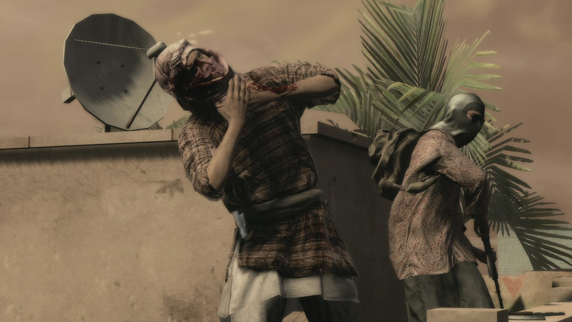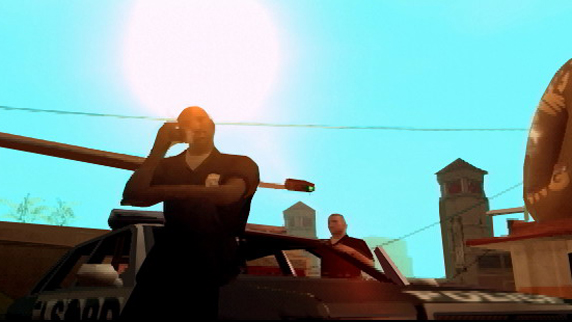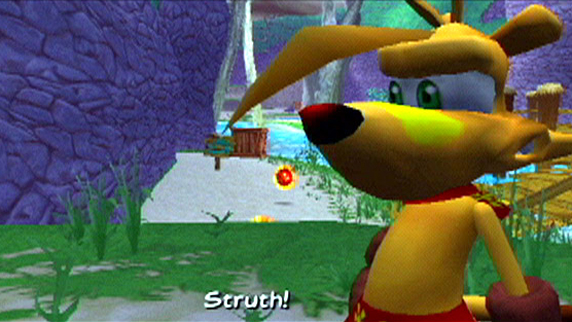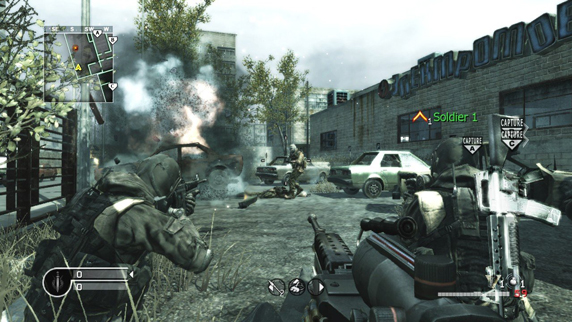I Game and I Vote: GameSpot AU's Guide to the Australian Federal Election
In the lead-up to Australia's upcoming federal election, GameSpot AU identifies the burning issues for gamers and finds out what both of the major political parties are promising to do about them.
My fellow Australians, the time is almost nigh to do your civic duty and march on down to vote in the upcoming federal election. But if all this talk of me-too-ism, interest rates, economic management, worms, climate change, and whatnot is starting to send you cross-eyed, then never fear. GameSpot AU is here to cut through the noise and present you with a video game-centric view of everything you'll need to know to make an informed decision on polling day.
That's right, we've picked the three most pressing issues for gamers in Australia and asked the two major parties--the Coalition and Labor--to outline their views, plans, and promises. We'll also put in our own two cents as the GameSpot AU Party, and explain what we would do should we ever get into the Lodge. (Unfortunately, bad timing and several matters still pending in international courts have prevented us from registering as a political party for this election--but next time!) So which party will make your life better as a gamer down under? Who should get your vote? Read on to make your decision!
Australia is without a doubt a great nation, but it's not as welcoming if you're the creators of Soldier of Fortune: Payback. Or Marc Ecko's Getting Up: Contents Under Pressure. Or Manhunt. That's because those three games--among many others--have been the victims of Australia's games-classification system courtesy of the Australian Office of Film and Literature Classification (OFLC). In Australia, the highest classification currently allowed for a video game is MA15+. Classification for other forms of entertainment media, such as films and DVDs, can go up to R18+, or even to X18. What the lower ceiling of classification for video games means is this: Any game considered by the OFLC to have content that is unsuitable for someone under the age of 15 is refused classification. That means it becomes illegal to sell, import, or display said game in Australia. Soldier of Fortune: Payback was the last game to be refused classification down under. Others include Reservoir Dogs, BMX XXX, Manhunt (after being approved and on sale for six months before reclassified), Grand Theft Auto III, Grand Theft Auto: San Andreas, Leisure Suit Larry: Magna Cum Laude, Postal, Postal 2, and NARC. (The Grand Theft Auto games listed were eventually made available for sale after some content changes by the developer).

To be fair, Australia's federal government is not solely responsible for games classification in this country. All of Australia's various state and territory attorneys general--as well as the federal attorney general--jointly make the decision on classification levels for different forms of media. This National Classification Code is what the OFLC then uses to make its decisions on ratings. Nevertheless, given that it governs our nation, the federal government is important in terms of its opinion about an R rating for video games. Here's the question we sent to both attorney general Philip Ruddock and shadow attorney general Senator Joe Ludwig:
Australia currently has no R18+ classification for video games. Do you support the future introduction of an R18+ rating? If not, why? If you do support an R18+ rating, will this be an issue you will be pursuing should you win government?
Their responses are below.
The Coalition: Attorney General Philip Ruddock
Philip Ruddock's office did not respond by GameSpot AU's deadline for this feature. But considering that Ruddock--along with the Local Government Association of Queensland--worked together to ultimately ban Marc Ecko's Getting Up: Contents Under Pressure in Australia in early 2006, we're guessing his views on introducing an R18+ rating won't be too forward-thinking.
Labor Party: Shadow Attorney General Joe Ludwig
"Australia's classification regime is, broadly, divided into two different streams: classification and enforcement. While--under the current arrangements--it is the responsibility of the Commonwealth to provide for the classification of materials, it is generally the responsibility of the state and territory governments to provide legislation for the enforcement of these classifications. The National Classification Code is set by agreement between the State, Territory, and Commonwealth governments.
"Any move to introduce additional ratings for video games would, therefore, have to be by mutual agreement.
"While I understand that many in the community desire the addition of an R18+ rating for video games, the Federal Labor Party does not believe that there are any fundamental problems with the functioning of the Classification system in Australia and, as such, we do not currently have any proposals to work with state governments to introduce such additional ratings for video games."

The GameSpot AU Party
Here at the GameSpot AU Party, we frankly feel it's ridiculous that Australia does not have an R18+ rating for video games. A game-rating system that tops out at MA15+ is endemic of old-school thinking that basically assumes that children are the only people who play games. As recent research by the Interactive Entertainment Association of Australia showed, the average age of the Australian gamer is 24.
If elected (and let's face it, we won't be), the GameSpot AU Party will respect the rights of adult Australians to play the content they prefer. Of course, children should not be exposed to adult material. But if you're over 18, then the game's on. Not only will we introduce an R18+ rating in Australia, but the GameSpot AU Party will also work with Rockstar to retroactively insert the Hot Coffee mod in all versions of Grand Theft Auto: San Andreas. In fact, we will insist that Rockstar insert Hot Coffee in all their products, including Table Tennis. We will also ensure that Leisure Suit Larry gets the Order of Australia.
What are your thoughts on how the elections could help or hurt games in Australia? Leave us a comment and let us know!
The Australian games-development industry is growing at a fast pace, with more than 40 development companies and 1,600 employees locally. The industry is worth more than A$110 million per annum, but the Game Developers' Association of Australia (GDAA)--the peak body representing local dev houses such as Tantalus, Auran, Krome, and more--thinks that amount can be larger. Much larger. The GDAA has in recent months been asking the federal government for a helping hand. Specifically, the GDAA is asking for the same 40 percent rebate that was introduced to help the Australian film industry. The GDAA says government support will result in an additional A$25 million in new investment into Australian-developed games.
Just before the election was called, the federal government--through Communication, Information Technology, and the Arts minister Senator Helen Coonan--essentially rebuffed the industry by saying that game developers would "not be eligible for the tax offsets" introduced for the film industry. But with the federal election now called, has the government changed its tune? And what would Labor do if it was in power? Here's the question we sent to both the Coalition and Labor:
The Games Developers' Association of Australia (GDAA) has recently been campaigning for more government assistance for the local industry. Specifically, they have asked for a 40 percent rebate introduced in this year's budget for the Australian film industry to be extended to the Australian video games development sector. What is your official stance on introducing this rebate for the games industry? In what other ways will a future Coalition/Labor government support the Australian games industry?

The Coalition: Minister for the Arts and Sport George Brandis
A spokesman for Minister Brandis replied to GameSpot AU with the following: "Minister Brandis indicated that were the Government to be re-elected, he would give consideration to their request in the new Parliament." The GDAA confirmed the federal government's revised stance on the 40 percent rebate, and GDAA CEO Greg Bondar said: "Senator Brandis was most sympathetic to our concerns and also undertook to ensure that a review of GDAA's call for a 40 percent tax rebate for the games industry in Australia would be undertaken if the Coalition was returned to government."
Labor Party: Shadow Minister for Communications and Information Technology Senator Stephen Conroy
"Labor has announced that they will work with the games industry in Australia, and recommends that the Game Developers' Association of Australia has a seat at the table at the review of the 40 percent tax rebate which has been afforded to the film industry.
"Labor recognises the contribution the games industry makes to the Australian cultural landscape, and the economy as a whole, and is keen to continue to work with the games industry to encourage growth of this important sector."

The GameSpot AU Party
The GameSpot AU Party will do everything in its power to support the local industry. This will include introducing a rebate--bumped up to 70 percent--for all games developed locally. To take the next step, the GameSpot AU Party will invest more than A$20 billion in an "IP hunt," during which we will buy the gaming world's biggest and brightest franchises and give them to newly cashed-up and resource-rich Australian dev houses. Imagine it--Grand Theft Auto: Brisvegas by Krome Studios, or Halo 4: Re-Finish the Fight by IR Gurus. Plus, every person working in the Australian games industry will be allowed to park their cars in disabled parking spots and not be fined. They will also get lifetime memberships to the sporting team of their choice--either that, or a lifetime supply of soft drinks and pizza vouchers for those late-night prelaunch crunch sessions to get the game out the door in time.
What are your thoughts on how the elections could help or hurt games in Australia? Leave us a comment and let us know!
To gamers, broadband access is becoming a critical component of playing games. Very few games nowadays live offline, which makes fast, affordable, and easily accessible broadband a must. Sadly, Australia isn't exactly a world leader when it comes to broadband, considering that a recent OECD report found our broadband to be among the slowest and most expensive globally. So what are the two major parties promising when it comes to broadband, and how will it affect gamers in Australia? Here's the question we sent through to both Communication, Information Technology, and the Arts minister Senator Helen Coonan and Labor Shadow Minister for Communications and Information Technology Senator Stephen Conroy:
1) Broadband is shaping up to be one of the key issues for this election campaign, and it is an especially important issue to gamers. If elected, what specific pledges can you make regarding:
a) Increases in average speeds for both urban and regional Australians
b) Increased accessibility, both in urban and regional areas
c) Lowering broadband costs for the average Australian

The Coalition: Communication, Information Technology, and the Arts minister Senator Helen Coonan
Senator Coonan's office did not respond by our deadline to GameSpot AU's request for comment. Given that the minister seemingly doesn't wish to communicate directly to Australian gamers, we have summarised the government's previously stated broadband infrastructure plan. Under the Coalition's Australia Connected plan, the government says it will build a A$958 million national high-speed network using a mixture of fibre-optic, ADSL2+, and wireless broadband that it claims will cover 99 percent of the population by June 2009. The government has also committed to build a new commercial fibre-optic network for built-up areas.
"The centrepiece of Australia Connected is the immediate rollout of a new, independent, competitive, and state-of-the-art national broadband network that will extend high-speed services out to 99 per cent of the population and provide speeds of 12 megabits per second by mid-2009," said Senator Coonan in a press release from June 2007. "Retail prices for both the new WiMAX and ADSL2+ broadband services will range from A$35 to A$60 per month, depending on the speed selected by the consumer. This demonstrates that we have met our commitment to ensure affordability and metro-comparable pricing for all Australians regardless of where they live."
Labor Party: Shadow Minister for Communications and Information Technology Senator Stephen Conroy
"After 11 years of Howard Government, and ineffectual policy that has resulted in 18 different broadband plans, Australia is still a broadband backwater. The OECD rates Australia 16th out of 30 countries for broadband access, and the Information Technology and Innovation Foundation (USA) ranks Australia 26th for broadband speeds. Labor will boost Australia's broadband performance and drag us out of the digital dark ages, by delivering a National Broadband Network that will deliver improved broadband to 100 percent of Australians.
"The National Broadband Network includes a fibre-to-the-node (FTTN) network that will deliver minimum broadband speeds of 12 megabits per second to 98 percent of the population. The remaining two percent will get access to the best available new technology, with connection speeds that are as close as possible to that delivered by the new network.
"Labor will commit up to A$4.7 billion to build the National Broadband Network, in partnership with the private sector. A$2 billion is from the Communications Fund, and Labor will ensure it is used for the purpose in which it was intended--to improve telecommunications in rural and regional areas. A$2.7 billion will be drawn from the Future Fund's shareholding in Telstra--to make better use of the Commonwealth's investment in telecommunications.
"Labor's A$4.7 billion commitment ensures the fibre-optic network reaches rural and regional Australians, not just the five capital cities as proposed by the private sector that forms the basis of the Howard Government's broadband plan.
"Labor recognises that Australians are subjected to prohibitively high broadband costs along with download limits and shaping of connection speeds, which restrict users and detract from the benefits of broadband. When it comes to cost, Labor believes that it is not the job of a politician to set consumer prices--rather this should be done by the winning tenderer for the National Broadband Network and the consumer watchdog, the ACCC.
"However, Labor also recognises that people living in countries [that] we consider our international peers have unlimited downloads while Australians' Internet use is currently restricted. To this end, Labor will hold an inquiry into the cost of Internet access with the aim of investigating the underlying causes of broadband pricing."

The GameSpot AU Party
The GameSpot AU Party recognises the urgent and very real need gamers have for fast and affordable broadband. To that end, the GameSpot AU Party pledges to spend A$100 billion toward building a new national broadband network that will ensure fibre connections to every home in Australia--every home. We pledge 30Mbps connections for everyone, with the cost to be heavily subsidised so that no Australian will pay more than A$4.95 per month (with no download caps). As for funding...well, we'll get it from somewhere. Defence, perhaps? Maybe roads. Anyway, the point is that we want an Australia where no one can ever use the excuse of "lag" for bad gameplay. And should we get elected to another term, we will also pledge to build a national Wi-Fi network to ensure everyone can use their Nintendo DS to battle with Pokémon characters wherever they are in Australia.
What are your thoughts on how the elections could help or hurt games in Australia? Leave us a comment and let us know!
Got a news tip or want to contact us directly? Email news@gamespot.com
Join the conversation